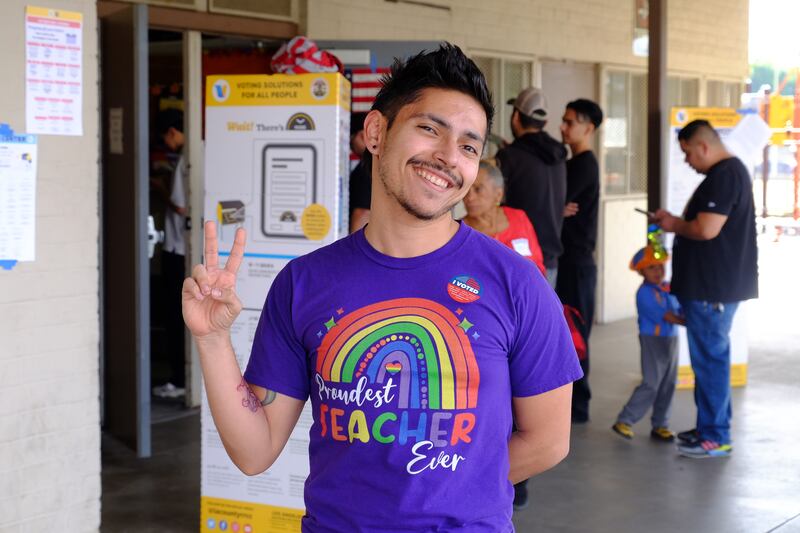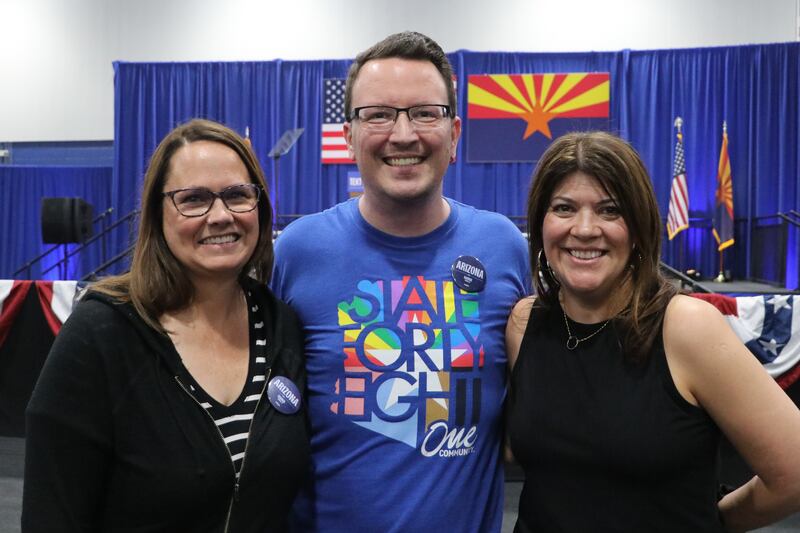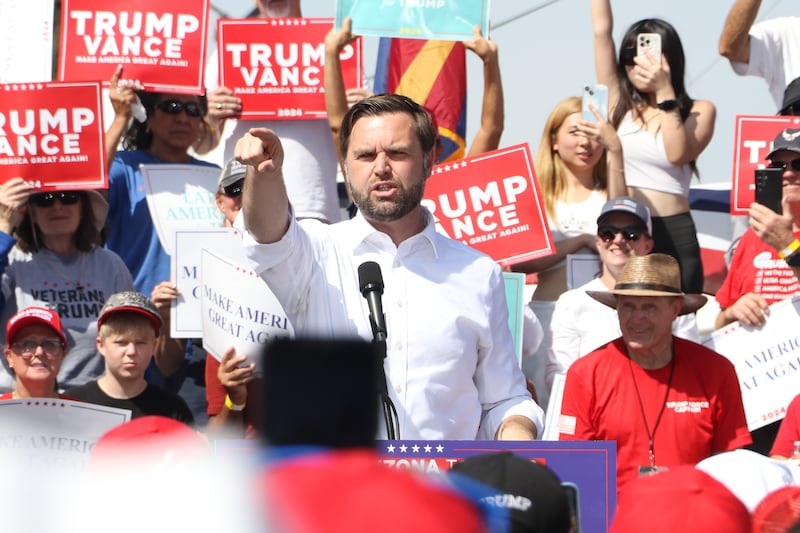It was two days before the election, on a sunny day in what’s known locally as the gay haven of Palm Springs, California, where more than 200 groups marched along the downtown street in the annual Pride parade. They waved rainbow flags or rode on floats with extravagant decorations and energetic music.
Between the clusters of children, families and drag queens were supporters of Democratic candidates for public offices, meeting queer voters and passionately garnering their support.
The party’s outreach and championing of gay and trans rights is one reason Democratic presidential nominee Vice President Kamala Harris earned nearly nine out of 10 votes from LGBTQ people in November.
With Donald Trump winning the presidency thanks in part to anti-trans campaigning, the queer community is now bracing for the coming four years of policy changes. They didn’t need to wait long — within hours of his inauguration, Trump issued an executive order forcing the federal government to only recognize two genders, male and female.
Before the election, there was a sense of hope. Standing under the California sun wearing a wide-brimmed hat and yellow blouse, former Palm Springs Mayor Lisa Middleton shook hands and took pictures with paradegoers as they thanked her for running for the California state Senate and representing the queer community.
Middleton was running to be the first openly transgender member in the state Legislature. She said she believed LGBTQ people should vote for Democrats like Harris and herself because of their open support to the community.
“On issues of reproductive freedom and LGBT equality, the Democratic Party is standing with our community and the Republican Party steadfastly opposes [our values],” Middleton said in an interview. She would lose her race to Sen. Rosilicie Ochoa Bogh by nearly 10 points a few days later.
The freedoms for Americans to “make decisions about their own bodies” and “love who they love openly” were among Harris’ key campaign messages.
But rights for the gay community have long been hot-button issues. In 1993, then-President Bill Clinton of the Democratic Party issued the “Don’t Ask, Don’t Tell” policy, which forced service members to hide their sexual orientations. He also signed the Defense of Marriage Act that defined marriage as only between a man and a woman.
Eleven years later, in 2004, Democratic presidential nominee then-Sen. John Kerry supported civil unions for same-sex couples, while then-President George W. Bush called for a federal ban on same-sex marriage.
The Democratic Party would not publicly embrace same-sex marriage until 2012.
“You’re a member of a community that is under attack for who you are,” Middleton added. “The issue of being attacked for who you are becomes the predominant issue that is driving your vote. We’ve seen that in every minority community historically.”
She said she believes the attacks — particularly on transgender people — are “relentless.”
“The attacks against the transgender community are, in fact, the first wave of attacks on the larger LGBT community,” she said. “If they can demonstrate that they can win elections by attacking transgender folks, it is going to spread.”
An NBC News Exit Poll showed 86% of LGBT voters supported Harris, the strongest performance in the last five presidential elections. Joe Biden won only 64% of LGBT voters in 2020.
Pablo Gutierrez, 26, a high school math teacher from Glendale, voted at a polling place in University Park, Los Angeles, during lunchtime, wearing a purple T-shirt with a rainbow print.

Gutierrez said he has been voting for Democrats since his first election and identity politics was a big part of his decision. He emphasized his brown and LGBTQ identities and said it was important to support Harris because of her historic candidacy in terms of gender and race.
“It is exciting to have a woman president,” Gutierrez said.
Identity politics is not necessarily the main issue for queer voters in this election.
Gabe Hagen, who owns a queer cafe in Tempe, Arizona with his husband, was queuing up with two of his fellow small business owners outside a community center to meet Doug Emhoff, Harris’ husband, in early October.

Introducing himself as a food service business owner, Hagen mentioned the economy as his top issue. He said the Biden administration addressed the post-pandemic supply chain issues well and the tax reductions and lending programs under Harris’s “opportunity economy” agenda would help his business.
Hagen’s business has received bomb threats and was the site of protests from the far-right extremist group, Proud Boys, during a drag story hour event in 2023. He said in this election cycle, he found it challenging to communicate with Republican supporters.
“The majority of Republicans are deep down an ecosystem of lies that they cannot listen to rational arguments, so there are fewer and fewer of them that are on ‘that side’ that we can have a genuine conservation with,” Hagen said.
Republicans in the queer community
Some queer voters stood proudly at Trump’s side.
In his third-shift job doing security, Peter Boykin, who identifies as gay, stared closely at computer screens with multiple election pages open as they showed the vote counts from across the country on Election Night.
“Honestly, it’s nice to see a huge win. It wasn’t close. It was awesome seeing that,” said Boykin, 47, in a Zoom interview from Mebane, North Carolina. He grinned while recalling himself at 3 a.m. that night, realizing Trump won 312 electoral votes. He only needed 270 to win.
“All those swing states went to Trump, you know, whoa,” Boykin said.
In a three-hour interview with podcaster Joe Rogan in October, Republican vice presidential nominee Sen. J.D. Vance claimed he “wouldn’t be surprised if me and Trump won just the normal gay guy vote.”

More than a quarter, or 27%, of LGBT voters supported Trump in 2020 and in this election, Trump won 12% of the votes, according to the NBC Exit Poll.
Boykin, who has unsuccessfully ran for public office for multiple times, manages the Gays For Trump Facebook group with more than 3,400 members. He said he voted for Trump because he “understands the people” and he is “for peace, not for war.”
“It’s called the art of the deal,” Boykin said, referencing the name of Trump’s bestselling 1987 book. “Trump is probably the only president who tries to steer us away from getting involved in problems in other countries.”
Boykin said he believed gay people had been “used” by Harris during the election campaign, but only Trump truly supports them.
“It’s like Pride month when everybody throws the flags out, and then as soon as the month is over, they take it down,” Boykin said. “Do they actually care? Are they just trying to get votes?”
He mentioned Trump’s address at the United Nations General Assembly in September 2019, when he expressed solidarity with LGBTQ people who “live in countries that punish, jail, or execute individuals based upon sexual orientation.”
“I didn’t see Kamala Harris going up there … but I saw Donald Trump do that,” Boykin said.
Advocacy group GLAAD, formerly known as the Gay and Lesbian Alliance Against Defamation, compiled a record of Harris engaging with LGBTQ people and taking action to support them as the vice president.
Harris also received a perfect score in the Human Rights Campaign congressional scorecard, which monitored her voting records in the U.S. Senate.

During a 2018 campaign for North Carolina House, Boykin said in an interview that he preferred “gays, lesbians, bisexuals and allies” over the LGBTQ acronym and gay people cannot let transgender people “interfere” with what they have accomplished in their agenda.
In the interview this year, he emphasized that Trump and himself were not anti-trans while admitting his feelings are complicated because he tried to motivate people into “sticking to the middle.”
“Trump said multiple times he didn’t care what bathroom somebody uses,” he said. “Trump stepped in and said ‘leave Budweiser alone,’” Boykin added, referring to a boycott on beer brand Bud Light following a promotion campaign involving a transgender influencer.
As for himself, Boykin said he didn’t “have a problem” with denying gender-affirming care for young people or banning transgender athletes from women’s sports, while he was concerned about the “social conservative evangelistic type” within the Republican Party planning to punish school counselors for supporting transgender students.
“They don’t want school officials to agree with somebody that they might not be in their right body,” said Boykin. “I’m worried that there won’t be any gay clubs in schools.”
Trump promised in his Agenda 47 platform to revoke federal policies on gender-affirming health care and “cease all programs that promote the concept of sex and gender transition at any age.” The platform also pledged for potential Civil Rights violations and federal funding elimination if any teacher suggests a child could be “trapped in the wrong body.” That plan sprang into action Monday.
Transgender issues in the election and beyond
In 1999, Tim Walz helped to form and then advised the first gay-straight alliance club at the southern Minnesota high school where he taught and coached football. It was a story the Democratic vice presidential nominee championed over the course of the election.
Since the beginning of his political career in 2005, he campaigned for gay rights, supporting same-sex marriage and prohibiting LGBTQ conversation therapy, as a member of the U.S. House and the governor of Minnesota.

Republicans mocked many of these efforts and sometimes chanted “Tampon Tim” at rallies, a reference to his support for gender-neutral bathrooms.
Trump’s campaign spent $11 million to run ads that used the issue more than 15,000 times, according to a database maintained by AdImpact.
“Kamala is for they/them, President Trump is for you” was a signature phrase repeatedly used by the candidate and other Republicans.
Most of the ads showed photographs, more than a decade old, of one California trans community college basketball player towering over her teammates.
Trans Americans spent the last few months preparing for the second Trump term, as they rushed to change their names and gender markers on government documents or stockpile medications. LGBTQ media also published guides for trans Americans, advising them on issues such as their healthcare access.
Kelley Robinson, president of Human Rights Campaign, which calls itself the largest LGBTQ civil rights organization in the U.S., said in a statement that she was “heartbroken” by the results of the presidential election while attempting to give hope to the community.
“The path ahead will be challenging, but we are prepared,” said Robinson. “You are not alone. You are loved. You are worthy. And you have an entire community standing with you, today and every day.”
